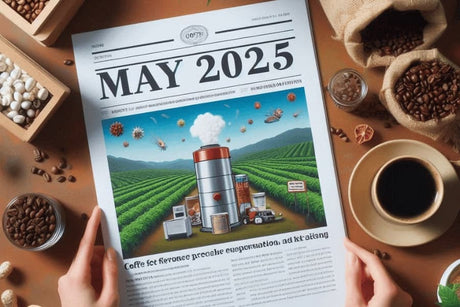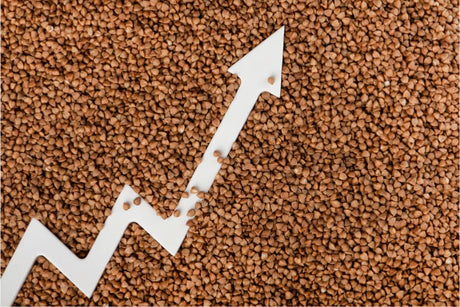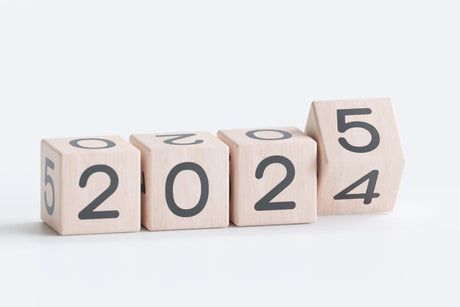“The world is changed by your example, not by your opinion". Paulo Coelho
mycuppa August 2022 Newsletter
Unfortunately, it was not long after Sendle's changes on 1 July to divert more of their parcels to partner Fastway/Aramex until we found ourselves in a real pickle.
Barely four days later, a pile of parcels was sitting in our warehouse for many days, waiting for Fastway to collect.
Of course, the local driver in our area knows we have parcels for collection every day, but it seems that Fastway are overloaded, or perhaps other games are being played at a more strategic level.
Whatever the reasons, no merchant can run a business with parcels waiting days to be collected - seriously disappointing.
So, folks, that's a sad and final farewell to Sendle, and unlike John Farnham and Elton John, this time, it is the end.
The excellent news is that AusPost has continued to kick goals everywhere—fast, efficient and, more importantly, incident-free.
We have received plenty of great feedback from our customers on the performance of AusPost, with many surprised at the improvements. It's a Cinderella story due to the new facility we access directly, bypassing the seemingly always choked Melbourne Parcel Facility - shaving between 1 -2 days from average transit times.
Whilst we understand some of our customers enjoyed Sendle's competitive shipping rates, especially for long distances, unfortunately, the reality for many of those long-haul deliveries carried by Sendle's partners involved suffering delays of almost twice or three times longer compared to AusPost - particularly WA, NT and Far North QLD.
Add into the mix a 900% higher risk of an incident occurring with Sendle, and those stats make for uncomfortable reading, and you can appreciate our decision to switch off Sendle.
Decaf painThere's been plenty of negativity published in the media over the last few months about rising inflation, cost of living, and interest rates.
We hate to add to these stories, and in the spirit of transparency, it's essential to provide our customers with advance notice of pending changes, this time with Decaf.
Decaf supply has been the most difficult we have seen. It's been this way since the beginning of the pandemic. The situation has not improved, only worsened. At times, you think it can't get any more difficult and then we hit another new low. Whenever we go to market, there's none for sale or delivery.
Decaf shortages have been extreme and chronic. Right now, there's barely a single bag of raw Decaf available for sale in Australia - the same thing happens every couple of months - stock runs out. The two major chemical-free processing factories that service the globe can't keep up.
A large ship is currently on the water sailing towards Australia with maybe 150+ tons of Decaf on board, but it certainly does not help with everyone scratching for Decaf.
Just like every other coffee traded, Decaf pricing has risen at even sharper rates due to the raw coffees destined for caffeine removal being shipped twice - once from origin to the Decaf processing plants (Canada or Mexico), then again from the Decaf processing plants to the importing country, e.g. Australia.
As the quality chemical-free (Swiss and Mountain Water) Decafs have risen in price, we see that EA chemical versions, which still occupy around 50% of the Decaf market, have also been increased in almost identical fashion - which has not much to do with shortages and more about the EA Decaf products taking advantage of a situation affecting the entire Decaf segment by exploiting the higher demand opportunity.
Decaf also involves much more labour than standard raw coffee processing, about 25% additional labour. The decaffeination of coffee occurs in countries facing significant labour shortages and high inflation levels.
Contract prices for new arrivals of Decaf are steep, and that will play out in the market - already started. We are cheap by comparison!
Our new shipment that does not arrive for another six weeks has 2x delicious certified Organic Decaf on board as we shift our entire Decaf offering to be fully Organic accredited lots. If you drink Decaf for health reasons, do it properly with a certified Organic product.
We will have enough raw Decaf to survive until the new stock arrives next month.
Although I hate to say it, please don't panic purchase or hoard Decaf. The mention of a shortage will likely drive customers into stockpiling, and we may need to impose limits.
The Stuff of Secrets
We sat down to design this month's Secret Label coffee with a clear set of goals, but what resulted took us a bit by surprise, and we mean that in a good way.
Chocolate complexity was not part of the brief. Still, somehow, it's there, and my goodness, it's lovely as we stretched the relationship between fruits and chocolate to find some interesting nuances.
Sweetness is a given. We are working with high-grade, premium lots that burst with fruit flavours and intricate complexity.
We had a different result for this month's Secret Label, and it's far better.
The design was supposed to have dominant fruit-driven complexity, and we ended up with plenty of that sweet fruit but also heaps of magic stuff, C-H-O-C-O-L-A-T-E.
August's Secret Label is so sweet that a need to the dentist might be in order - extraordinary.
We stretched the relationship between fruit and chocolate in a way we never thought possible.
As a black, savour its fruity elements. The chocolate notes are an excellent contrast to the sweet fruits in milk.
Lovely nectarine, plum, tea rose, vanilla, milk, and dark chocolate.

Why your choice of grinder matters
Coffee grinders tend to suffer from the ugly duckling syndrome, banished into the background whilst shiny espresso machines sit proudly admired.
Yet it's the humble grinder where most flavour enjoyment is achieved (or lost). For a surprisingly better bang for your buck, consider upgrading the grinder before upgrading an espresso machine.
If you genuinely love coffee or believe that good gear makes a noticeable difference, investing in a decent coffee grinder will be one of the best decisions ever.
We have always encouraged our customers to purchase whole beans and grind moments before use - the only way to enjoy coffee in the best possible conditions.
Pre-ground coffee is an inferior experience, and at the risk of upsetting some of our customers, pre-ground coffees can be a waste of $$, even when taking the freshest roasted coffee beans straight from the roaster, grinding and sealing the packs as fast as we possible can.
Pre-ground coffees stale at rates more than 500%+ faster than whole beans.
Ground coffee lasts less than 15 minutes once ground (for espresso machine duty). When you open and shut the pack, it's game over (some brew methods can tolerate ground coffee that has degraded, but espresso simply won't).
Pre-ground coffee is, unfortunately, a steep and slippery slope to mediocrity.
Coffee grinders are a reliable, cheap, efficient appliance. Depending upon the quality of your grinder, it should produce great coffees over a long period, providing you with a sound return on investment.
Although as I was preparing this article, a friend for whom I purchased a Breville grinder as a gift during the lockdowns for use at home barely 14 months ago told me it's busted already, just out of warranty and with scarcely 4kg of coffee passing through it.
Whilst not intended to be a slur on Breville, we don't consider Breville or Sunbeam grinders as devices that are "built to last", or in some applications like espresso duty; they may not be entirely up to the task.
Most quality grinders should last over ten years, so it's a cost equation of less than a buck or two every week if you purchase a better grinder.
You may have heard it before a simple maxim when it comes to buying coffee equipment.
"Spend more on the grinder and less on the machine".Or, if you love coffee enough and don't have a limited budget, buy a quality grinder and espresso machine!
When you have a fixed or limited budget, please don't fall into the easy trap of thinking the taste of coffee is determined solely by the shiny espresso machine, as the dull and unattractive grinder plays a more critical and vital role in the flavour of your cup.
Cheap grinders don't cut it for espresso coffee - bad pun, but true.
Don't think for a minute that a $100 grinder will produce uniform and consistent ground particle sizes; for that matter, some $300 grinders could be better at ground particle size consistency.
The ground coffee's particle size (and shape) governs and influences the flavours you taste in the cup.
It's not the marketing hype of "ceramic burrs" or other features like digital adjustment displays; it's all about the quality of the system and the ground coffee it produced - which, by the way, is rarely mentioned in product reviews.
In an ideal world, all coffee grinders would produce a particle size that is uniformly round and consistent across the sample. However, the reality is that coffee grinders suffer from quite wide variations in particle size as they "hack" the beans. Like hitting with an axe!
Some are better than others, and I'm not telling you which ones are good or bad.
The only proven way to produce optimal ground coffee is with 3-stage roller grinders, which start at $350,000 for entry-level systems and motor vehicle size.
All other grinders, including commercial models used in cafes, whether flat planar burrs or conical, work by "hacking" coffee beans aggressively.
So why does the consistency of particle size matter?
Well, let's take a typical example from an average domestic grinder.
The particle size may vary by 40% - a mix of fine, coarse and the desired particle sizes in the ground coffee. The distribution of that size in particles influences the extraction efficiency.
When using ground coffee for espresso extraction, the particle size must be consistent as water under pressure will flow faster through the gaps between larger particles, offering lower resistance (channelling) and leading to under-extraction.
Yet, the flow will simultaneously be slower through the finer particles and over-extract.
The result is an unstable or unbalanced coffee taste.
Under-extracted coffee is weak, watery, thin, and lacking body, flavour, and sweetness.
Over-extracted coffee has a bland flavour, with some accompanying bitter taints from excessive contact time between the ground coffee and the hot water under pressure. The cup may also have muted sweetness, acidity and complexity when the particle size is variable.
It's not easy to measure the particle size distribution of ground coffees without the use of expensive laser diffraction, and that's also not something you can pop around the corner to your local shops and submit your ground coffee sample for analysis. I wish it were that easy because the bad grinders would be named and shamed.
You also can't fix a grinder if the particle size distribution is broad - that's a fundamental design issue.
But you can take some active steps to improve the ground coffee consistency by investing in a better quality coffee grinder. We don't sell grinders or recommend brands, but with enough research, you should find the answer - there are certainly enough grinder-nerd-geeks out there on the internet only too happy to show off their kit.
Unfortunately, the better grinders are expensive - like most things in life, it costs more to have the best.
A giant grinder does not always mean better quality grinds - it can make the problem worse by hacking the beans faster. The other important point to remember is that with a giant grinder, You will also have to contend with higher levels of retained grounds for larger grinders, meaning the waste increases by needing to purge more coffee.
I would also caution that conical designs don't necessarily mean a better cup result than a flat burr. This debate usually occurs in a commercial cafe arena, but the upshot remains the same, burrs cause particle size variances.
If drinking great coffee is your goal, please consider spending upwards of $500+ on a grinder (or preferably $1k+), and if that means taking some $$ from your budget and the espresso machine to fit, then it will be well spent.
You can always match a superior grinder with an average espresso machine and still produce great-tasting coffees.
However, pairing an inferior grinder with an expensive machine will likely produce poor results or lower levels of consistency, and it may get frustrating.
Stay aware of the salesperson's comments about how the bling espresso machine will deliver excellent coffee. Grinding is everything.
The other point worth mentioning is that "built-in" grinders on fully automatic machines and those like the Breville Oracle are typically lower in capacity and capability compared to standalone grinders as there are significant compromises machine builders must make to "fit" grinders into the small space of automatic systems.
We are not advocating using a separate grinder to feed ground coffee into an automatic machine, just simply highlighting that expensive automatic machines do not have decent grinders - it's a well-known fact!
As we don't sell equipment and we don't have any commercial or financial interests or affiliations with equipment suppliers, we can, however, speak from our extensive experience and suggest to our customers to consider looking at Compak or Macap brand grinders as excellent examples of proven technology, reliability and performance.
Macap and Compak brands have both been independently imported into Australia by family businesses involved in the coffee equipment market for more than 25+ years. You can rely upon their experience and backup support as they provide a comprehensive solution to retailers.
These are not grinders with plastic gears or drive mechanisms that fail after a few years.
At an industrial level, we spend significant capital to ensure the grind particle size of our coffees is extremely precise and consistent because we know how important that is to ultimate flavour.
We continue investing in grinding infrastructure to achieve the best consistency.









